上外英语专业考研翻译真题及答案01-06(超级豪华精装版)
上海外国语大学翻译专业研究生历年真题
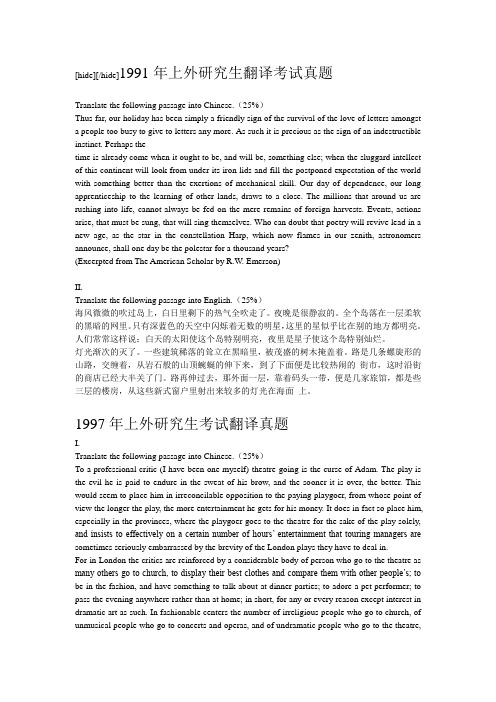
[hide][/hide]1991年上外研究生翻译考试真题Translate the following passage into Chinese.(25%)Thus far, our holiday has been simply a friendly sign of the survival of the love of letters amongst a people too busy to give to letters any more. As such it is precious as the sign of an indestructible instinct. Perhaps thetime is already come when it ought to be, and will be, something else; when the sluggard intellect of this continent will look from under its iron lids and fill the postponed expectation of the world with something better than the exertions of mechanical skill. Our day of dependence, our long apprenticeship to the learning of other lands, draws to a close. The millions that around us are rushing into life, cannot always be fed on the mere remains of foreign harvests. Events, actions arise, that must be sung, that will sing themselves. Who can doubt that poetry will revive lead in a new age, as the star in the constellation Harp, which now flames in our zenith, astronomers announce, shall one day be the polestar for a thousand years?(Excerpted from The American Scholar by R.W. Emerson)II.Translate the following passage into English.(25%)海风微微的吹过岛上,白日里剩下的热气全吹走了。
上海外国语大学考研英专2010年汉译英真题

上海外国语大学考研英专2010年汉译英真题分享中译英这是一个人类发展史上不断重复的故事,古老而常新,平凡而惊心动魄:一群赤手空拳的男女老少,背井离乡来到一片原始的荒野,筚路蓝缕,创业维艰。
有的人壮志未酬,中途倒下;有的人知难而退。
胜利终于属于那些坚韧不拔,信心、毅力和智慧都超群的人。
于是那野性的大自然的烈马般的反抗被驯服了,昔日荒山野岭变成千里沃野。
人终于用双手建立起美好的家园和丰衣足食的生活,人也从这求生存的搏斗中得到自我完成。
This is a story unfolding constan tly in man’s history of development, seemingly old and common but actually new and soul-stirring: a number of people, men and women, old and young, left their homeland behind and eventually set foot on a virgin land of wildness. Starting from scratch and dressed in rags, they made strenuous efforts in cultivating their new fields and began their new life. Some struggled but fell half way, thus failing to fulfill their great ambitions; Some reconciled themselves to difficulties on the way. Triumph finds its way to those with perseverance, having firm most faith in themselves,most strong-willed and intelligent. Therefore, the futile mountainous wild land was turned into vast stretches of fertile fields, and the primitive nature, once resembling a vicious horse, was tamed. Thereupon, men established the beautiful homeland with their own hands and lived a well-off life. During the survival battle against nature, men felt content about themselves. 可以从各种不同的角度来谈《啊,拓荒者!》:例如,从中了解美国边疆开拓史;研究美国在本世纪初资本主义发展中田园诗般的人际关系的解体;邻里、家庭、两性关系的嬗变;还有宗教在那一代人的生活中所占的地位和作用,等等。
上海外国语大学翻译硕士考研真题解析
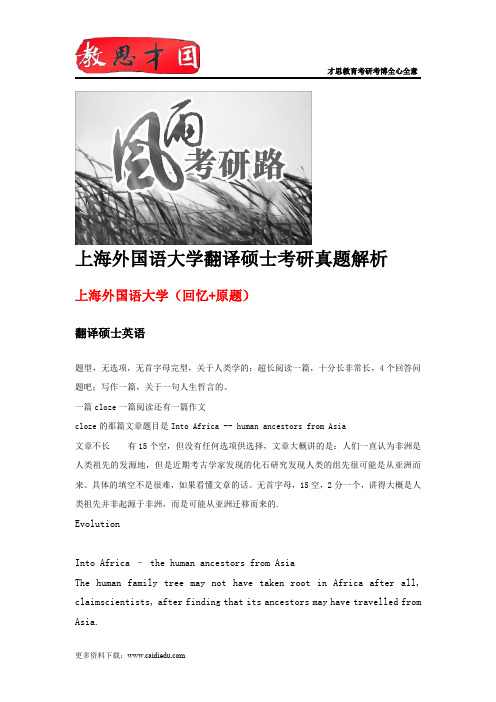
上海外国语大学翻译硕士考研真题解析上海外国语大学(回忆+原题)翻译硕士英语题型,无选项,无首字母完型,关于人类学的;超长阅读一篇,十分长非常长,4个回答问题吧;写作一篇,关于一句人生哲言的。
一篇cloze一篇阅读还有一篇作文cloze的那篇文章题目是Into Africa--human ancestors from Asia文章不长有15个空,但没有任何选项供选择,文章大概讲的是:人们一直认为非洲是人类祖先的发源地,但是近期考古学家发现的化石研究发现人类的组先很可能是从亚洲而来。
具体的填空不是很难,如果看懂文章的话。
无首字母,15空,2分一个,讲得大概是人类祖先并非起源于非洲,而是可能从亚洲迁移而来的.EvolutionInto Africa–the human ancestors from AsiaThe human family tree may not have taken root in Africa after all, claimscientists,after finding that its ancestors may have travelled fromAsia.By Richard Alleyne,Science Correspondent7:00PM BST27Oct2010While it is widelyaccepted that man evolved in Africa,in fact its immediate predecessors mayhave1colonised thecontinent after developing elsewhere,the study says.The claims are madeafter a team2unearthedthe fossils of anthropoids–the primate group that includes humans,apes andmonkeys–in Libya's Dur At-Talah.Paleontologistsfound that3amongstthe39million year old fossils there were three distinct families ofanthropoid primates,all of whom lived in the4area at approximately the same time.Few or anyanthropoids are known to have existed in Africa during this 5period,known as theEocene epoch.This could eithersuggest a huge gap in Africa's fossil record–6unlikely, say the scientists,given the amount ofarchaeological work undertaken in the area–7or that the species"colonised"Africafrom another continent at this time.As the evolutioninto three species would have8taken extreme lengths of time,combined with the lack of fossilrecords in Africa,the team concludes that Asia was the most likely9origin.Writing in thejournal Nature,the experts said they believed migration from Asia to be themost10plausibletheory.Christopher Beard,of the Carnegie Museum of Natural History in Pittsburgh, said:"11If our ideas are correct,this early colonisation of Africa by anthropoids was a truly12pivotal event—one ofthe key points in our evolutionary history."At the time,Africa was an island continent;when these13anthropoids appeared,there was nothing on thatisland that could compete with them. "It led to aperiod of flourishing evolutionary divergence amongstanthropoids,and one ofthose lineages14resultedin humans."If our earlyanthropoid ancestors had not succeeded in migrating from Asia to Africa,wesimply15wouldn'texist."He added:"This extraordinary new fossil site in Libya shows us that in the middleEocene,39million years ago,there was a surprising diversity of anthropoidsliving in Africa,whereas few if any anthropoids are known from Africa beforethis time."This suddenappearance of such diversity suggests that these anthropoids probably colonisedAfrica from somewhere else."Withoutearlier fossil evidence in Africa,we're currently looking to Asia as the placewhere these animals first evolved."阅读。
上海外国语大学英语语言文学专业2006年考研英汉互译试题 无答案
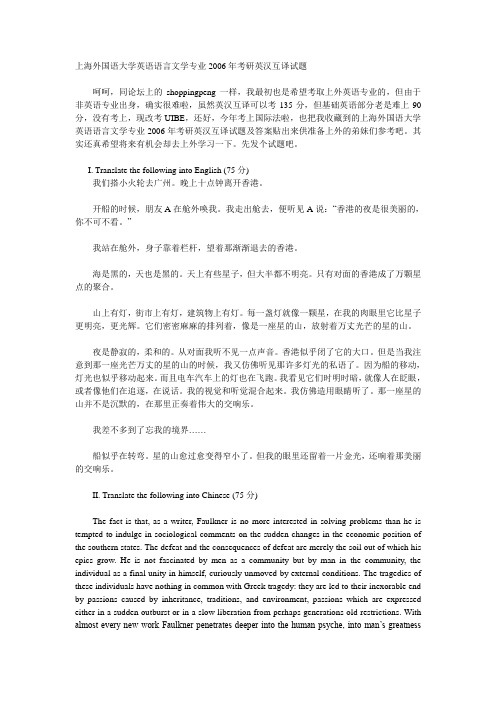
上海外国语大学英语语言文学专业2006年考研英汉互译试题呵呵,同论坛上的shoppingpeng一样,我最初也是希望考取上外英语专业的,但由于非英语专业出身,确实很难啦,虽然英汉互译可以考135分,但基础英语部分老是难上90分,没有考上,现改考UIBE,还好,今年考上国际法啦,也把我收藏到的上海外国语大学英语语言文学专业2006年考研英汉互译试题及答案贴出来供准备上外的弟妹们参考吧。
其实还真希望将来有机会却去上外学习一下。
先发个试题吧。
I. Translate the following into English (75分)我们搭小火轮去广州。
晚上十点钟离开香港。
开船的时候,朋友A在舱外唤我。
我走出舱去,便听见A说:“香港的夜是很美丽的,你不可不看。
”我站在舱外,身子靠着栏杆,望着那渐渐退去的香港。
海是黑的,天也是黑的。
天上有些星子,但大半都不明亮。
只有对面的香港成了万颗星点的聚合。
山上有灯,街市上有灯,建筑物上有灯。
每一盏灯就像一颗星,在我的肉眼里它比星子更明亮,更光辉。
它们密密麻麻的排列着,像是一座星的山,放射着万丈光芒的星的山。
夜是静寂的,柔和的。
从对面我听不见一点声音。
香港似乎闭了它的大口。
但是当我注意到那一座光芒万丈的星的山的时候,我又仿佛听见那许多灯光的私语了。
因为船的移动,灯光也似乎移动起来。
而且电车汽车上的灯也在飞跑。
我看见它们时明时暗,就像人在眨眼,或者像他们在追逐,在说话。
我的视觉和听觉混合起来。
我仿佛造用眼睛听了。
那一座星的山并不是沉默的,在那里正奏着伟大的交响乐。
我差不多到了忘我的境界……船似乎在转弯。
星的山愈过愈变得窄小了。
但我的眼里还留着一片金光,还响着那美丽的交响乐。
II. Translate the following into Chinese (75分)The fact is that, as a writer, Faulkner is no more interested in solving problems than he is tempted to indulge in sociological comments on the sudden changes in the economic position of the southern states. The defeat and the consequences of defeat are merely the soil out of which his epics grow. He is not fascinated by men as a community but by man in the community, the individual as a final unity in himself, curiously unmoved by external conditions. The tragedies of these individuals have nothing in common with Greek tragedy: they are led to their inexorable end by passions caused by inheritance, traditions, and environment, passions which are expressed either in a sudden outburst or in a slow liberation from perhaps generations-old restrictions. With almost every new work Faulkner penetrates deeper into the human psyche, into man’s greatnessand powers of self-sacrifice, lust for power, cupidity, spiritual poverty, narrow-mindedness, burlesque obstinacy, anguish, terror, and degenerate aberrations. As a probing psychologist he is the unrivalled master among all living British and American novelists. Neither do any of his colleagues possess his fantastic imaginative powers and his ability to create characters. His subhuman and superhuman figures, tragic or comic in a macabre way, emerge from his mind with a reality that few existing people - even those nearest to us - can give us, and they move in a milieu whose odours of subtropical plants, ladies’perfumes, Negro sweat, and the smell of horses and mules penetrate immediately even into a Scandinavian’s warm and cosy den. As a painter of landscapes he has the hunter’s intimate knowledge of his own hunting-ground, the topographer’s accuracy, and the impressionis t’s sensitivity. Moreover—side by side with Joyce and perhaps even more so—Faulkner is the great experimentalist among twentieth-century novelists. Scarcely two of his novels are similar technically. It seems as if by this continuous renewal he wanted to achieve the increased breadth which his limited world, both in geography and in subject matter, cannot give him.。
上外英语专业考研翻译真题及答案01-06(超级豪华精装版)
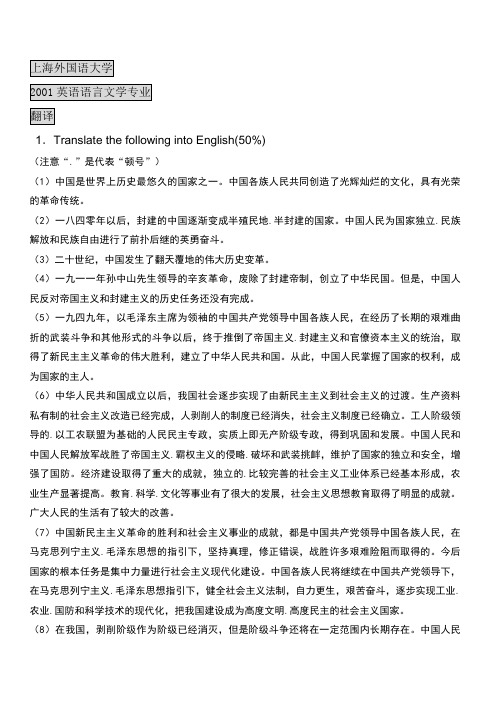
1.Translate the following into English(50%)(注意“.”是代表“顿号”)(1)中国是世界上历史最悠久的国家之一。
中国各族人民共同创造了光辉灿烂的文化,具有光荣的革命传统。
(2)一八四零年以后,封建的中国逐渐变成半殖民地.半封建的国家。
中国人民为国家独立.民族解放和民族自由进行了前扑后继的英勇奋斗。
(3)二十世纪,中国发生了翻天覆地的伟大历史变革。
(4)一九一一年孙中山先生领导的辛亥革命,废除了封建帝制,创立了中华民国。
但是,中国人民反对帝国主义和封建主义的历史任务还没有完成。
(5)一九四九年,以毛泽东主席为领袖的中国共产党领导中国各族人民,在经历了长期的艰难曲折的武装斗争和其他形式的斗争以后,终于推倒了帝国主义.封建主义和官僚资本主义的统治,取得了新民主主义革命的伟大胜利,建立了中华人民共和国。
从此,中国人民掌握了国家的权利,成为国家的主人。
(6)中华人民共和国成立以后,我国社会逐步实现了由新民主主义到社会主义的过渡。
生产资料私有制的社会主义改造已经完成,人剥削人的制度已经消失,社会主义制度已经确立。
工人阶级领导的.以工农联盟为基础的人民民主专政,实质上即无产阶级专政,得到巩固和发展。
中国人民和中国人民解放军战胜了帝国主义.霸权主义的侵略.破坏和武装挑衅,维护了国家的独立和安全,增强了国防。
经济建设取得了重大的成就,独立的.比较完善的社会主义工业体系已经基本形成,农业生产显著提高。
教育.科学.文化等事业有了很大的发展,社会主义思想教育取得了明显的成就。
广大人民的生活有了较大的改善。
(7)中国新民主主义革命的胜利和社会主义事业的成就,都是中国共产党领导中国各族人民,在马克思列宁主义.毛泽东思想的指引下,坚持真理,修正错误,战胜许多艰难险阻而取得的。
今后国家的根本任务是集中力量进行社会主义现代化建设。
中国各族人民将继续在中国共产党领导下,在马克思列宁主义.毛泽东思想指引下,健全社会主义法制,自力更生,艰苦奋斗,逐步实现工业.农业.国防和科学技术的现代化,把我国建设成为高度文明.高度民主的社会主义国家。
外研社英语专业试题答案

外研社英语专业试题答案一、单项选择题(每题1分,共20分)1. Which of the following is the correct form of the verb "to be" in the past simple tense?A. amB. isC. areD. were答案:D2. Fill in the blank with the correct preposition: She is interested _______ learning French.A. inB. onC. atD. by答案:A3. Choose the word that is synonymous with "unpredictable":A. foreseeableB. regularC. certainD. constant答案:A4. The phrase "break the ice" means to:A. freeze the waterB. start a conversationC. stop a fightD. make a hole in the ice答案:B5. Which sentence is in the passive voice?A. The teacher will explain the text tomorrow.B. The text was explained by the teacher yesterday.C. The text explains the main ideas.D. The text has been explained by the teacher.答案:B6. What is the superlative form of the adjective "happy"?A. happierB. happiestC. more happyD. most happy答案:B7. Choose the correct phrasal verb: "He decided to _______ his studies and travel the world."A. give upB. take upC. go overD. get through答案:A8. Which of the following is a countable noun?A. informationB. adviceC. equipmentD. knowledge答案:B9. The correct order of adjectives in English is: quantity, quality, size, age, shape, color, proper adjective, purpose. Which sentence follows this order?A. "She has a beautiful, small, old, round, red Japanese vase."B. "He bought a new, large, square, wooden, green American table."C. "I saw a cheap, used, blue, rectangular, Chinese computer."D. "They found a few, expensive, tiny, round, yellow French coins."答案:A10. What is the indefinite article used before a consonant sound?A. aB. anC. theD. - (zero article)答案:A11. Choose the correct translation for "take into account":A. 考虑到B. 考虑到账户C. 考虑到账单D. 考虑到项目答案:A12. Which of the following sentences is correct?A. If I would have known, I would have told you.B. If I had known, I would have told you.C. If I have known, I would tell you.D. If I know, I will tell you.答案:B13. The word "meticulous" is an antonym for:A. carelessB. preciseC. hastyD. thorough答案:A14. Fill in the blank with the correct modal verb: You_______ touch the artwork in the museum.A. canB. mayC. mustD. shall答案:B15. What is the past participle of the verb "write"?A. writeB. wroteC. writtenD. writes答案:C16. Choose the correct phrase to complete the sentence: "He is the one who always _______ the meetings."A. takes overB. takes inC. takes offD. takes on答案:A17. Which sentence uses the correct comparative degree?A. This book is more interesting than that one.B. This is the most interesting book.C. This book is interestinger than that one.D. This book is more interested than that one.答案:A18. What is the direct object in the sentence "The teacher gave the students homework"?A. the teacherB. the studentsC. homeworkD. gave答案:C19. Choose the correct translation for "make up one's mind":A. 编造一个故事B. 改变某人的想法C. 做出决定D. 弥补某人的错答案:C20. Which sentence is in the present perfect tense?A. She has finished her work.B. She finished her work.C. She will finish her work.D. She was finishing her work.答案:A[此处省略其他题目及答案]二、完形填空题(每题1分,共20分)[文章略]三、阅读理解题(每题2分,共40分)[文章略]四、翻译题(英译汉,每题3分,共30分)[文章略]五、写作题(共30分)[题目略][文章略][注:以上内容为模拟试题答案,实际考试内容以官方发布为准。
上外版大学英语精读一课文翻译Unit1-6
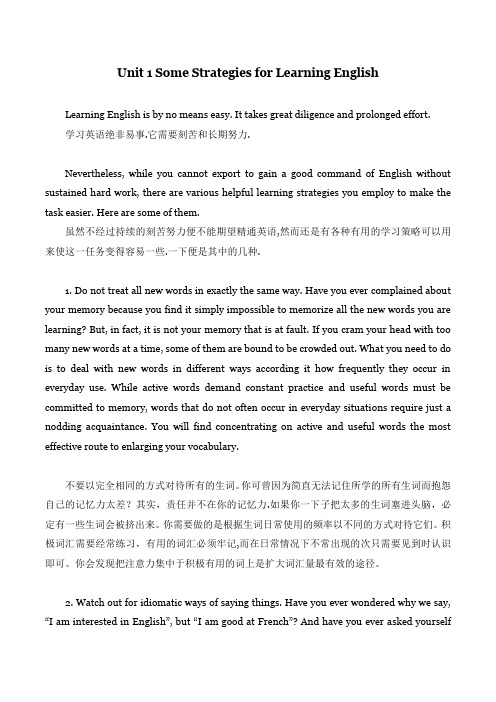
Unit 1 Some Strategies for Learning EnglishLearning English is by no means easy. It takes great diligence and prolonged effort.学习英语绝非易事.它需要刻苦和长期努力.Nevertheless, while you cannot export to gain a good command of English without sustained hard work, there are various helpful learning strategies you employ to make the task easier. Here are some of them.虽然不经过持续的刻苦努力便不能期望精通英语,然而还是有各种有用的学习策略可以用来使这一任务变得容易一些.一下便是其中的几种.1. Do not treat all new words in exactly the same way. Have you ever complained about your memory because you find it simply impossible to memorize all the new words you are learning? But, in fact, it is not your memory that is at fault. If you cram your head with too many new words at a time, some of them are bound to be crowded out. What you need to do is to deal with new words in different ways according it how frequently they occur in everyday use. While active words demand constant practice and useful words must be committed to memory, words that do not often occur in everyday situations require just a nodding acquaintance. You will find concentrating on active and useful words the most effective route to enlarging your vocabulary.不要以完全相同的方式对待所有的生词。
(NEW)上海外国语大学高级翻译学院《841翻译实践(英汉互译)》历年考研真题及详解

目 录2009年上海外国语大学高级翻译学院841翻译实践(英汉互译)考研真题及详解2006年上海外国语大学高级翻译学院841翻译实践(英汉互译)考研真题及详解2009年上海外国语大学高级翻译学院841翻译实践(英汉互译)考研真题及详解I. Translate the following into Chinese(75分)The Short MarchBy BILL POWELL/SHANGHAI Thursday, Feb. 14, 2008Locals sell produce outside the gates of one of Songjiang’s new developmentsOn a cold, gray afternoon a year ago, I stood on the deck of our newly purchased, half-constructed house about an hour outside Shanghai, wondering what, exactly, I had gotten myself into. My wife, a Shanghai native, and I had moved back to China from New York City in the spring of 2004, and 21/2 years later we had decided to take the plunge. We bought a three-story, five-bedroom townhouse way out in the suburbs, in a town called New Songjiang, a place that was then—and remains now—very much a work in progress.We had come here that day to see how construction was progressing. Our house, along with about 140 others, was going up in a development called Emerald Riverside. It sits on the banks of a tributary that dumps into the Huangpu, the river that cuts Shanghai in two about 28 miles (45 km) to the northeast. On that dreary afternoon I gazed out to the other side of the river, looking at the only significant patch of land for miles that was not yet being developed—about five acres (20,000 sq. m) of green that local farmers still used to grow watermelons, which they then sold to the migrant workers building this town. On the far bank there was a ramshackle one-room brick house, where three of the farmers lived—a husband, wife and teenage son. They had no running water—they bathed and washed their clothes in the river—and the place was lit by a single bulb. In every direction just beyond the watermelon patch, office parks and houses and apartment complexes were going up, forming a cordon around the farmland that was drawing inexorably tighter. As it is in vast swathes of China, the new was replacing the old, and it was not doing so slowly. It was doing so in the blink of an eye.I stood on the deck that day and watched one of the farmers who worked the watermelon patch, an older woman who would later introduce herself to us as Liu Yi, as she stared back at me across the river. I remember thinking to myself, My god, what must be going through her mind? Not only is the land she works on about to disappear, but there’s this foreigner standing over there staring at her. Where did he come from and, more to the point, what in the world is he doing out here? The short answer is that my wife and I have become a tiny part of China’s latest revolution. We got an off-the-shelf mortgage from the Standard Chartered Bank branch in town, plunked down 25% of the purchase price, and bought ourselves a piece of the Great Chinese Dream.Best Years of Their LivesFor the past decade and a half, the frantic pace of urbanization has been the transformative engine driving this country’s economy, as some 300-400 million people from dirt-poor farming regions made their way to relative prosperity in cities. Within the contours of that great migration, however, there is another one now about to take place—less visible, but arguably no less powerful. As China’s major cities—there are now 49 with populations of one million or more, compared with nine in the U.S. in 2000—become more crowded and more expensive, a phenomenon similar to the one that reshaped the U.S. in the aftermath of World War II has begun to take hold. That is the inevitable desire among a rapidly expanding middle class for a little bit more room to live, at a reasonable price; maybe a little patch of grass for children to play on, or a whiff of cleaner air as the country’s cities become ever more polluted.This is China’s Short March. A wave of those who are newly affluent and firm in the belief that their best days, economically speaking, are ahead of them, is headed for the suburbs. In Shanghai alone, urban planners believe some 5 million people will move to what are called “satellite cities” in the next 10 years. To varying degrees, the same thing is happening all across China. This process—China’s own suburban flight—is at the core of the next phase of this country’s development, and will be for years to come.The consequences of this suburbanization are enormous. Think of how the U.S. was transformed, economically and socially, in the years after World。
- 1、下载文档前请自行甄别文档内容的完整性,平台不提供额外的编辑、内容补充、找答案等附加服务。
- 2、"仅部分预览"的文档,不可在线预览部分如存在完整性等问题,可反馈申请退款(可完整预览的文档不适用该条件!)。
- 3、如文档侵犯您的权益,请联系客服反馈,我们会尽快为您处理(人工客服工作时间:9:00-18:30)。
1.Translate the following into English(50%)(注意“.”是代表“顿号”)(1)中国是世界上历史最悠久的国家之一。
中国各族人民共同创造了光辉灿烂的文化,具有光荣的革命传统。
(2)一八四零年以后,封建的中国逐渐变成半殖民地.半封建的国家。
中国人民为国家独立.民族解放和民族自由进行了前扑后继的英勇奋斗。
(3)二十世纪,中国发生了翻天覆地的伟大历史变革。
(4)一九一一年孙中山先生领导的辛亥革命,废除了封建帝制,创立了中华民国。
但是,中国人民反对帝国主义和封建主义的历史任务还没有完成。
(5)一九四九年,以毛泽东主席为领袖的中国共产党领导中国各族人民,在经历了长期的艰难曲折的武装斗争和其他形式的斗争以后,终于推倒了帝国主义.封建主义和官僚资本主义的统治,取得了新民主主义革命的伟大胜利,建立了中华人民共和国。
从此,中国人民掌握了国家的权利,成为国家的主人。
(6)中华人民共和国成立以后,我国社会逐步实现了由新民主主义到社会主义的过渡。
生产资料私有制的社会主义改造已经完成,人剥削人的制度已经消失,社会主义制度已经确立。
工人阶级领导的.以工农联盟为基础的人民民主专政,实质上即无产阶级专政,得到巩固和发展。
中国人民和中国人民解放军战胜了帝国主义.霸权主义的侵略.破坏和武装挑衅,维护了国家的独立和安全,增强了国防。
经济建设取得了重大的成就,独立的.比较完善的社会主义工业体系已经基本形成,农业生产显著提高。
教育.科学.文化等事业有了很大的发展,社会主义思想教育取得了明显的成就。
广大人民的生活有了较大的改善。
(7)中国新民主主义革命的胜利和社会主义事业的成就,都是中国共产党领导中国各族人民,在马克思列宁主义.毛泽东思想的指引下,坚持真理,修正错误,战胜许多艰难险阻而取得的。
今后国家的根本任务是集中力量进行社会主义现代化建设。
中国各族人民将继续在中国共产党领导下,在马克思列宁主义.毛泽东思想指引下,健全社会主义法制,自力更生,艰苦奋斗,逐步实现工业.农业.国防和科学技术的现代化,把我国建设成为高度文明.高度民主的社会主义国家。
(8)在我国,剥削阶级作为阶级已经消灭,但是阶级斗争还将在一定范围内长期存在。
中国人民对敌视和破坏我国社会主义制度的国内外的敌对势力和敌对分子,必须进行斗争。
(9)台湾是中华人民共和国的神圣领土的一部分。
完成统一祖国的大业是包括台湾同胞在内的全国人民的神圣职责。
2 .Translate the following into Chinese(50%):A man may usually be known by the books he reads as well as by the company he keeps; for there is a companionship of books as well as of men; and one should always live in the best company, whether it be of books or of men.A good book may be among the best of friends. It is the same today that it always was, and it will never change. It is the most patient and cheerful of companions. It does not turn its back upon us in times of adversity or distress. It always receives us with the same kindness; amusing and instructing us in youth, and comforting and consoling us in age.Men often discover their affinity to each other by the love they have each for a book---just as two persons sometimes discover a friend by the admiration which both have for a third. There is an old proverb, “Love me, love my dog.” But there is more wisdom in this: “Love me, love my book.” The book is a truer and higher bond of union. Men can think, feel, and sympathize with each other through their favourite author. They live in him together, and he in them.“Books,”said Hazlitt, “wind into the heart; the poet‟s verse slides in the current of our blood. We read them when young, we remember them when old. We feel that it has happened to ourselves. They are to be had very cheap and good. We breathe but the air of books.”A good book is often the best urn of a life enshrining the best that life could think out; for the world of a man‟s life is, for the most part, but the world of his thoughts. Thus the best books are treasuries of good words, the golden thoughts, which, remembered and cherished, become our constant companions and comforters. “They are never alone,” said Sir Philip Sidney, “that are accompanied by noble tho ughts.”The good and true thought may in times of temptation be as an angel of mercy purifying and guarding the soul. It also enshrines the germs of action, for good words almost always inspire to good works.Books possess an essence of immortality. They are by far the most lasting products of human effort. Temples and statues decay, but books survive. Time is of no account with great thoughts, which are as fresh today as when they first passed through their author‟s minds, ages ago. What was then said and thought still speaks to us as vividly as ever from the printed page. The only effect of time has been to sift out the bad products; for nothing in literature can long survive but what is really good.Books introduce us into the best society; they bring us into the presence of the greatest minds that have ever lived. We hear what they said and did; we see them as if they were really alive; we sympathize with them, enjoy with them, grieve with them; their experience becomes ours, and we feel as if we were in a measure actors with them in the scenes which they describe.The great and good do not die even in this world. Embalmed in books, their spirits walk abroad. The book is a living voice. It is an intellect to which one still listens. Hence we ever remain under the influence of the great men of old. The imperial intellects of the world are as much alive now as they were ages ago.1.Translate the following into English(50%)发展社会主义文化的根本任务,是培养一代又一代有理想.有道德.有文化.有纪律的公民。
要坚持以科学的理论武装人,以正确的舆论引导人,以高尚的精神塑造人,以优秀的作品鼓舞人。
坚持和巩固马克思主义的指导地位,帮助人们树立正确的世界观.人生观和价值观,坚定对马克思主义的信仰.坚定对社会主义的信念.增强对改革开放和现代化建设的信心.增强对党和政府的信任,增强自立意志.竞争意志.效率意志.民主法制意志和开拓创新精神。
